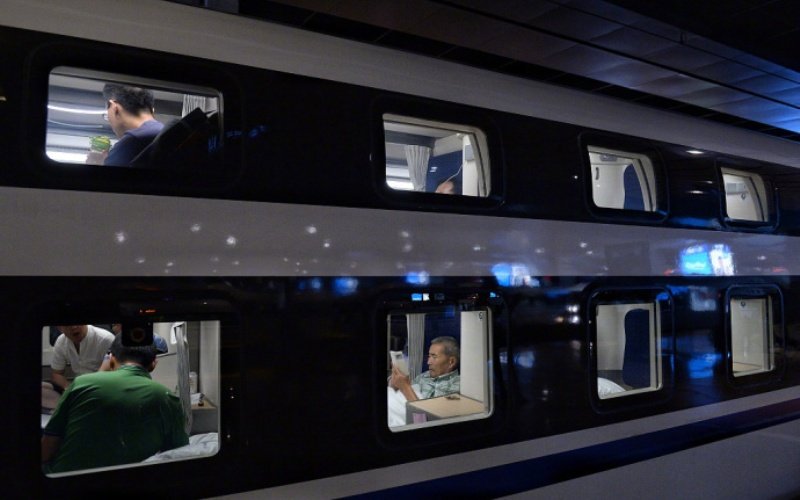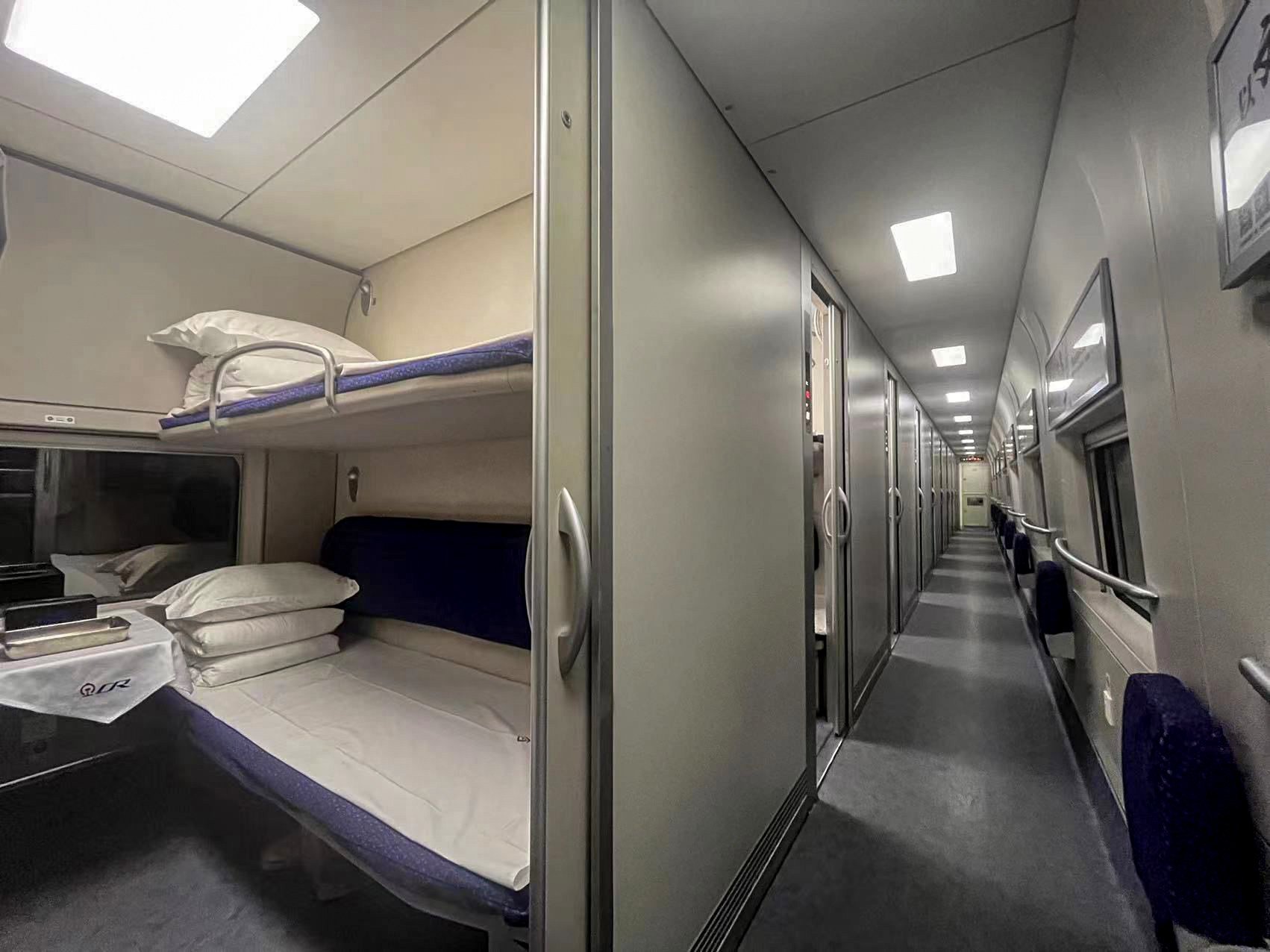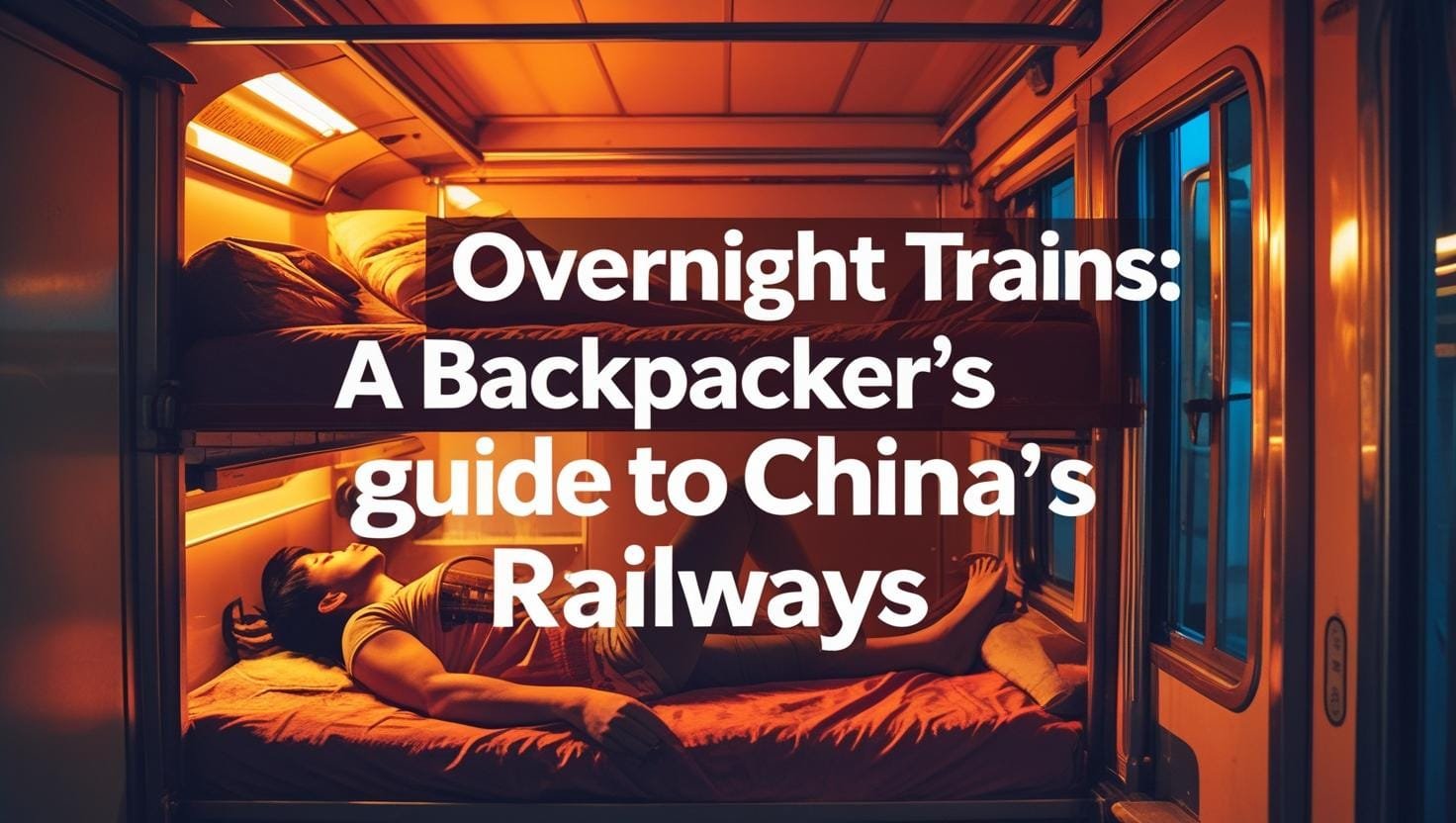# Overnight Trains: A Backpacker’s Guide to China’s Railways
China, a land of unparalleled beauty and diverse landscapes, offers an incredible experience for any traveler. For the adventurous backpacker looking to explore this vast country, finding efficient and economical ways to traverse great distances is key. And that’s where China’s extensive railway network, particularly its **overnight trains**, comes into play. Here at jusha.travel, we love sharing tips to make your China journey unforgettable, and there’s truly no better way to immerse yourself in the local rhythm, save on accommodation, and cover vast expanses than by hopping aboard a sleeper train.
**Overnight trains** are not just a mode of transport; they’re an adventure in themselves, offering a unique window into Chinese life while being incredibly friendly on your wallet—a true boon for **budget transportation**. This guide will delve into everything you need to know about navigating China’s railways, making your **China rail travel** seamless and an integral part of your **backpacking China** experience. We’ll cover the different types of **sleeper trains**, essential booking tips, and how to make the most of your journey, ensuring your **travel planning** is as smooth as possible.
Understanding China’s Overnight Train Landscape
China’s railway system is a marvel of engineering, constantly evolving to meet the demands of its immense population and growing tourism. For backpackers, the most relevant options for **overnight trains** fall into a few key categories, each offering a different level of comfort and price point. Understanding these distinctions is crucial for your **travel planning** and for choosing the right **sleeper trains** for your adventure.
* ***Slow Trains (Conventional Overnight Trains):*** These are the classic, workhorse trains of China, renowned for their affordability and their authentic atmosphere.
* ***Hard Sleeper (Yingwo 硬卧):*** This is arguably the most popular choice for backpackers and those seeking a truly local experience. A hard sleeper carriage typically consists of open sections, each with six bunks—an upper, middle, and lower bunk on either side. There’s no door, meaning less privacy, but it creates a more communal environment. The lower bunk is often preferred due to slightly more space and easier access, although it’s also the most social. Upper bunks offer more privacy but limited headroom. While the name “hard” might sound daunting, the beds are generally padded and comfortable enough for a good night’s sleep. This is the epitome of **budget transportation** in China. Learn more about hard sleepers from [Postcards from Mimi](https://www.postcardsfrommimi.com/train-travel-china/).
* ***Soft Sleeper (Ruanwo 软卧):*** A step up in comfort and privacy, soft sleeper compartments usually house four bunks (two upper, two lower) and come with a lockable door. The beds are notably softer (hence the name), and the carpeting helps dampen noise. If you’re traveling as a group of four, booking an entire soft sleeper compartment can be incredibly convenient and offers a good level of privacy for your **China rail travel**. This is a popular mid-range option for those who value comfort but still want to be economical. [Travel China Guide](https://www.travelchinaguide.com/china-trains/overnight-sleeper.htm) provides excellent details on soft sleepers.
* ***Hard Seat (Yingzuo 硬座):*** While available on many overnight routes, hard seat is generally *not* recommended for an overnight journey. These carriages are often crowded, and the seats are rigid, making sleep difficult. It’s the cheapest option, but the discomfort outweighs the savings for most overnight travelers.
* ***Standing Ticket (Wuzuo 无座):*** For exceptionally crowded routes, you might only find standing tickets. This is highly inadvisable for overnight trips due to the sheer discomfort and lack of any resting place.
* ***High-Speed Sleeper Trains:*** China’s cutting-edge high-speed network also features some **sleeper trains** on select long-distance routes. These are more modern, quieter, and offer a more premium experience, often featuring individual capsule-like berths or more comfortable bunk arrangements. They are faster than conventional trains but also come at a higher price point. If you prioritize speed and modern comforts and your budget allows, these can be a great option for your **travel planning**. [Travel China Guide](https://www.travelchinaguide.com/china-trains/overnight-sleeper.htm) has information on high-speed sleepers.
* ***Deluxe Sleepers (Gaoduan Ruanwo 高端软卧):*** Found only on a very limited number of routes (like Beijing to Xi’an), these offer an even more luxurious experience with private compartments, sometimes featuring an en-suite bathroom or larger beds. They are rare, expensive, and difficult to book, often selling out quickly. They are certainly not typical for **backpacking China** but are worth knowing about for future reference. For insights into deluxe sleepers, check [TripAdvisor’s China Forum](https://www.tripadvisor.co.nz/ShowTopic-g294211-i642-k14455949-Sleeper_train_advice-China.html).
 Essential Tips for Booking Your Journey
Essential Tips for Booking Your Journey
Effective **travel planning** is paramount when it comes to securing your spot on China’s **overnight trains**. Popular routes and specific bunk preferences (especially lower bunks in hard sleeper and soft sleeper compartments) can sell out surprisingly fast, particularly during peak travel seasons like national holidays or summer.
* ***When to Book:*** Aim to book your tickets as early as possible. Chinese train tickets typically become available 15 days before the departure date. For popular routes or if you have specific preferences (like a lower bunk), try to book right when they open.
* ***Where to Book:***
* ***Online Platforms:*** Several reputable English-language websites act as agents, allowing you to book tickets even before the 15-day window opens (they will then purchase them on your behalf). Popular choices include Trip.com or China Highlights, which charge a small service fee but offer convenience and English support. These are excellent for **backpacking China** from afar.
* ***At the Train Station:*** You can purchase tickets directly at any train station ticket window. However, this often involves long queues, and English-speaking staff aren’t guaranteed. Make sure to have your passport ready, as it’s required for all bookings.
* ***Through a Travel Agency:*** Local travel agencies in China can also assist with ticket purchases, sometimes for a fee. This can be a good option if you’re already in China and need help navigating the booking process in Chinese.
* ***Bunk Preference:*** When booking online, you can often request a specific berth (upper, middle, or lower). While agents do their best to fulfill requests, there’s no absolute guarantee unless explicitly confirmed. If comfort is a priority for your **sleeper trains** experience, the lower bunk is generally the most desirable due to more space and easier access. For more advice on specific berths, check out [Postcards from Mimi](https://www.postcardsfrommimi.com/train-travel-china/).
* ***Booking a Compartment:*** If you’re traveling with friends or family and desire privacy, especially in a soft sleeper, you can book all four berths in a compartment. This provides a private space for your group during your **China rail travel**. [Diary of a Tourist](https://diaryofatourist.com/2018/01/19/how-to-take-an-overnight-sleeper-train-in-china/) offers tips on booking entire compartments.
* ***Passport is Key:*** Remember, your passport is your ticket. You’ll need it to purchase tickets and to board the train. Keep it safe and accessible.
 Life Onboard: Making the Most of Your Journey
Life Onboard: Making the Most of Your Journey
Once your tickets are secured, getting ready for the actual journey on **overnight trains** requires a little preparation to ensure comfort and safety. These practical tips will greatly enhance your **backpacking China** experience.
* ***Arrive Early:*** This cannot be stressed enough. Train stations in China are huge and busy, and security checks can take time. Aim to arrive at least 60-90 minutes before departure, especially if you need to pick up physical tickets. Additionally, boarding early helps you secure luggage space, as overhead racks and under-bunk areas fill up quickly, particularly in hard sleeper carriages. [Travel China Guide](https://www.travelchinaguide.com/china-trains/overnight-sleeper.htm) emphasizes the importance of early arrival.
* ***Luggage Security:*** While generally safe, it’s always wise to keep valuables (passport, money, electronics) close to you. Consider using a small padlock for your backpack zippers or keeping critical items in a smaller daypack that you can keep on your bunk. Avoid leaving expensive items unattended.
* ***Water and Food:*** Most trains have a hot water dispenser at the end of each carriage, perfect for instant noodles, tea, or coffee. Bring your own reusable mug or bottle! While dining cars exist, they can be pricey. It’s often more economical and enjoyable to bring your own snacks and drinks for your **budget transportation** journey.
* ***Toilets and Washing Facilities:*** Toilets are located at the end of each carriage. They can range from squat toilets to Western-style ones, but they are generally basic. Bring your own toilet paper and hand sanitizer. Sinks are available for washing up, but tap water is *not* potable. Pack travel-sized toiletries, a small towel, and a toothbrush, as these are not provided.
* ***Prepare for Sleep:*** Lights in sleeper carriages typically go out between 10:00 PM and 10:30 PM. To ensure a good night’s rest, especially if you’re a light sleeper, pack earplugs and an eye mask.
* ***Entertainment:*** Wi-Fi on trains is rare, so pre-load your devices with movies, e-books, podcasts, or music. A portable power bank is essential, as electrical sockets can be limited and often quickly claimed.
* ***Cultural Nuances:*** **China rail travel** is a fantastic way to observe local life. You might witness families sharing meals, card games, or lively conversations. Embrace the experience! However, be mindful of noise levels, especially at night. If you’re in a hard sleeper, you might find yourself sharing snacks or a conversation with your bunkmates – a truly authentic cultural exchange. Read more about train etiquette on [Postcards from Mimi](https://www.postcardsfrommimi.com/train-travel-china/).
* ***Arrival Alerts:*** Don’t worry about missing your stop! Train attendants usually walk through the carriages about 30-40 minutes before major stops, waking up passengers for their destination.
 The Unbeatable Value of Overnight Trains for Backpackers
The Unbeatable Value of Overnight Trains for Backpackers
The allure of **overnight trains** for **backpacking China** goes far beyond mere transportation; it’s a strategic choice for savvy travelers. The primary draw is undeniably the incredible value they offer, perfectly aligning with the spirit of **budget transportation**.
* ***Cost Savings:*** This is perhaps the most significant benefit. By opting for an **overnight train**, you combine two major travel expenses—transportation and accommodation—into one. A hard sleeper ticket, for instance, is often significantly cheaper than a domestic flight plus a night in a hostel or hotel. Even soft sleepers generally present a better value than high-speed rail combined with accommodation. While journeys are longer (some can stretch 15-20 hours or more), the daytime hours saved by traveling while you sleep are invaluable for maximizing your sightseeing time. For deeper insights into the cost-effectiveness, check [Postcards from Mimi](https://www.postcardsfrommimi.com/train-travel-china/).
* ***Efficiency:*** Traveling overnight means you wake up in your new destination, ready to explore. This efficient use of time is a game-changer for those on a tight schedule, allowing you to cover vast distances across China without losing precious daylight hours. It’s a perfect strategy for **travel planning** if you want to see as much as possible.
* ***Cultural Immersion:*** Beyond the practicalities, **China rail travel** on **sleeper trains** offers an unparalleled cultural immersion. In the hard sleeper carriages especially, you’ll be among locals from all walks of life—families on vacation, migrant workers heading home, students returning to university. This shared space often leads to impromptu interactions, shared snacks, and fascinating insights into everyday Chinese life. It’s an authentic experience that often surpasses what you might encounter in popular tourist spots. You can read more about this unique cultural aspect from [Postcards from Mimi](https://www.postcardsfrommimi.com/train-travel-china/).
* ***Scenic Views:*** While **overnight trains** are primarily about getting from A to B while you sleep, waking up to the changing landscapes of China is a magical experience. Depending on your route, you might see sprawling farmlands, mist-shrouded mountains, or bustling city outskirts come into view as the sun rises.
* ***Sustainability:*** For environmentally conscious travelers, choosing trains over flights is a more sustainable mode of transport, reducing your carbon footprint as you explore China.
Ultimately, whether you choose the communal charm of a hard sleeper or the greater privacy of a soft sleeper, **overnight trains** are an indispensable part of the **backpacking China** adventure. They offer a unique blend of affordability, efficiency, and authentic cultural encounters that no other mode of transport can match.
Conclusion
Embarking on a journey through China by **overnight trains** is more than just transportation; it’s a quintessential part of the **backpacking China** experience. From the bustling train stations to the rhythmic sway of the carriages, every moment offers a unique insight into the heart of this incredible country. Whether you’re seeking ultra-**budget transportation** with a hard sleeper, a comfortable private space with **sleeper trains**, or a blend of both, **China rail travel** on these **overnight trains** is an efficient, economical, and unforgettable way to traverse China’s vast and diverse landscapes.
This form of **travel planning** not only saves you money on accommodation but also deepens your cultural understanding, allowing you to connect with locals and witness the country’s daily life far beyond the usual tourist trails. Here at jusha.travel, we encourage you to embrace this adventure and let the railway tracks guide you through an authentic Chinese experience.
Have you traveled on China’s **overnight trains**? Share your tips and experiences in the comments below! For more comprehensive guides, travel inspiration, and insights into China’s culture, food, and attractions, don’t forget to visit [jusha.travel](https://jusha.travel) and explore our related articles. Your next Chinese adventure awaits!


3 comments
[…] First, choose your platform. Start with official options like the China Railway 12306 website or app for direct access, but for English support and easier payments, try third-party sites like Trip.com. This rail booking system is designed for efficiency, allowing you to secure seats on fast trains without hassle. For tips on mastering high-speed trains for budget travel, refer to https://jusha.travel/?p=1454. […]
[…] To make the most of your trip, try these packing hacks for high-speed rail travel in China to stay efficient and considerate. Proper preparation for bullet train journeys can save space and avoid hassles, focusing on lightweight and essential items. https://jusha.travel/?p=1454 […]
[…] bustling city streets to booking high-speed train tickets and ordering delicious local cuisine, mobile travel planning apps are not just convenient – they’re absolutely essential. Here at jusha.travel, we love […]